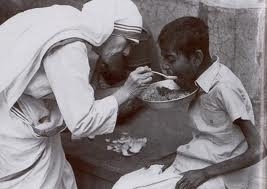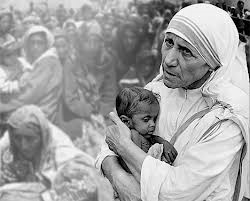 |
| Mother Teresa is praying to God. (http://www.time.com/time/world/article/0,8599,1668 (David Van Biema)) |
"Two roads diverged in a wood, and I- I took the one less
traveled by, and that has made all the difference" (Robert Frost). This excerpt
from Robert Frost's poem "The Road Not Taken" illustrates Mother Teresa's life
choices and how the path she took was no ordinary one. Mother Teresa, named
Agnes Bojaxhiu, was born on August 26, 1910, just before the outbreak of World
War I. She was born in Skopje, Yugoslavia,
to Albanian parents and had two older siblings. At the age of 18, she joined a covenant
in Ireland and become a missionary nun. She is a hero in many ways because she
possesses noble qualities such as altruism as well as bravery and strong morals.
Agnes Bojaxhiu, commonly known as Mother Teresa, lived a selfless life in
holiness and grace; she dedicated her life to the poor, ill, abandoned,
unloved, and the dying because of her strong faith and she was forever loyal to
God.
Mother Teresa's determination and strong faith kept her from
returning to her convent and simple life with her family. She made a difficult
decision at 18, when she decided to leave her family and follow God's call:
"When Lazar, who had already left home to become an Albanian military officer,
questioned his sister's choice in a letter, Agnes replied, 'You think you are
important because you are an officer serving a king with two million subjects.
But I am serving the King of the whole world" (Gold
20-21). When her brother disagreed with her choice to become a nun, she did not
step down from her decision, but instead stood stronger with her choice. She
knew that serving God would bring joy to her, causing her to feel immensely happy.
There were numerous things that Mother Teresa gave up in order to follow God's
call: "Becoming a nun not only meant giving up
the chance to marry and have children, it also meant giving up all her worldly
possessions and her family, perhaps forever" (Rosenberg). Mother Teresa
gave up any other opportunities her life would have held for her if she had not
joined to the convent. Nevertheless, she took the leap of faith and put her trust
in God. By leaving her family to join the convent, she let go of any other
potential futures and proved that she did not think materialistically when she
made the choice. She was motivated to live and serve God and by doing so she
risked the likelihood of never seeing her family again.
 |
| Mother Teresa fed the hungry. (http://theinnerkingdom.wordpress.com/2010/12/07/let-us-love-one-another-by-mother-ter (Thomas Moore)) |
Mother Teresa devoted her life to her mission in the belief
that everyone was valuable and every life was worth saving. Her views on
abortion were made evident when she made her speech after receiving the Nobel
Prize for Peace. "She plunged directly into the central theme of her speech,
the evils of abortion: 'We are talking about peace, but, I feel that the
greatest destroyer of peace today is abortion. Because it is a direct war, a
direct killing- direct murder by the mother herself'"(Slavicek 72). She spoke
out and let the public know what she valued and her beliefs. This made her vulnerable
to harsh criticism. Mother Teresa believed that abortion was destroying an
innocent person's life, one who did not even get the chance to live. Despite the
issue of abortion, Mother Teresa came to Calcutta and discovered her purpose. When
she saw the slums of Calcutta, she realized why God had brought her there: "Mother Teresa founded the Kalighat Home for the
Dying. She and her fellow nuns gathered dying Indians off the streets of
Calcutta and brought them to this home to care for them during the days before
they died" (U*X*L Biographies). Mother Teresa did not want these
people suffering on the streets any longer; she saw that they lived as animals
but believed that they should die as human beings. Her compassion for these
people demonstrated the passion she had for serving the poor and those in need.
Even though she could have possibly caught leprosy by attending to the dying,
she did not worry, but instead made it her priority to help them. Mother
Teresa's courage and willpower made her well known and a worldwide icon of
charity. Although some viewed her values as controversial, she continued to carry
out her mission.
 |
| Mother Teresa cared for the homeless. (http://www.priestsforlife.org/blog/index.php/remembering-mother-teresa-2 (Fr. Frank Pavone)) |
Mother Teresa acted selfless throughout her angelic life, speaking
to the world through her altruistic acts. Her commitment to serve God is beyond
doubt inspirational. "She dedicated her life to helping the poor, the sick, and
the dying around the world, particularly those in India. Her selfless work with
the needy brought her much acclaim and many awards, including the Nobel Peace
Prize in 1979" (U*X*L Biographies). She made a difference and saved countless
lives. Mother Teresa's life was a blessing to the dying and the poor,
especially in India. She gained a great extent of recognition for her religious
work, but was humble. "She herself tried to deflect all attention away from
what she did to either the works of her group or to the god who was her
inspiration" (Encyclopedia of World Biography). Mother Teresa used her newfound fame to promote her mission instead of basking in the pristine glory. She was modest about her deeds and turned the
attention to her true inspiration, God. Mother Teresa's devotion to the
unfortunate was significantly respected and recognized by the public.
Mother Teresa once said, "Being unwanted, unloved, uncared for, forgotten by everybody, I think that is a much greater hunger, a much greater poverty than the person who has nothing to eat." Her compassionate words and wondrous deeds reflected the holy life she lived while serving her greatest inspiration, God. Mother Teresa was always determined to help the poor and never let anything get in her way from doing so. Mother Teresa devoted her life to those in dire need. She inspires me because of her infinite faith in God and the work she had left behind for others to follow. She chose the right path and best way to live her life. She serves as a role model to me because of her selfless love and eternal compassion for the poorest of the poor. Her life is an example to live by, showing us that we should not judge others because of their assets but rather take care of one another. Mother Teresa shares with us a great meaning in life, that as humans we should always love our neighbor no matter who they may be. Her beautiful and simple smile became an international icon of charity; she took the road less traveled by and represented an epitome of altruism.
Works Cited
"Being unwanted, unloved, uncared for, forgotten by everybody, I think that is a much greater hunger, a much greater poverty than the
person who has nothing to eat." Skipping Stones Nov.-Dec. 2011: 26. Gale Student Resources In Context. Web. 18 Dec. 2012.
D'Souza, Thomas. "INDIA Mother Teresa's Legacy for a "new Evangelisation" in the Year of
Faith - Asia News." INDIA Mother Teresa's Legacy for a "new Evangelisation" in the
Year of Faith - Asia News. AsiaNews, 5 Sept. 2012. Web. 08 Jan. 2013.
Gold, Maya. Mother Teresa: A Photographic Story of a Life. New York: DK, 2008. Print.
Moore, Thomas. Mother Teresa: No Greater Love. Novato: MJF, 1989. Print.
"Mother Teresa." Encyclopedia of World Biography. Detroit: Gale, 1998. Gale Student Resources In Context. Web. 9 Dec. 2012.
Pavone, Frank, Fr. "Remembering Mother Teresa | Fr. Frank Pavone's Blog." Fr Frank
Pavones Blog RSS. Priest for Life, 27t= Aug. 2012. Web. 08 Jan. 2013.
Rosenberg, Jennifer, About.com Guide. "Mother‚ Teresa." About.com 20th Century History. About, Inc., 2012. Web. 10 Dec.
2012.
Slavicek, Louise Chipley. Mother Teresa: Caring for the World's Poor. New York: Chelsea House, 2007. Print.
Page created on 1/9/2013 12:00:00 AM
Last edited 1/9/2013 12:00:00 AM
